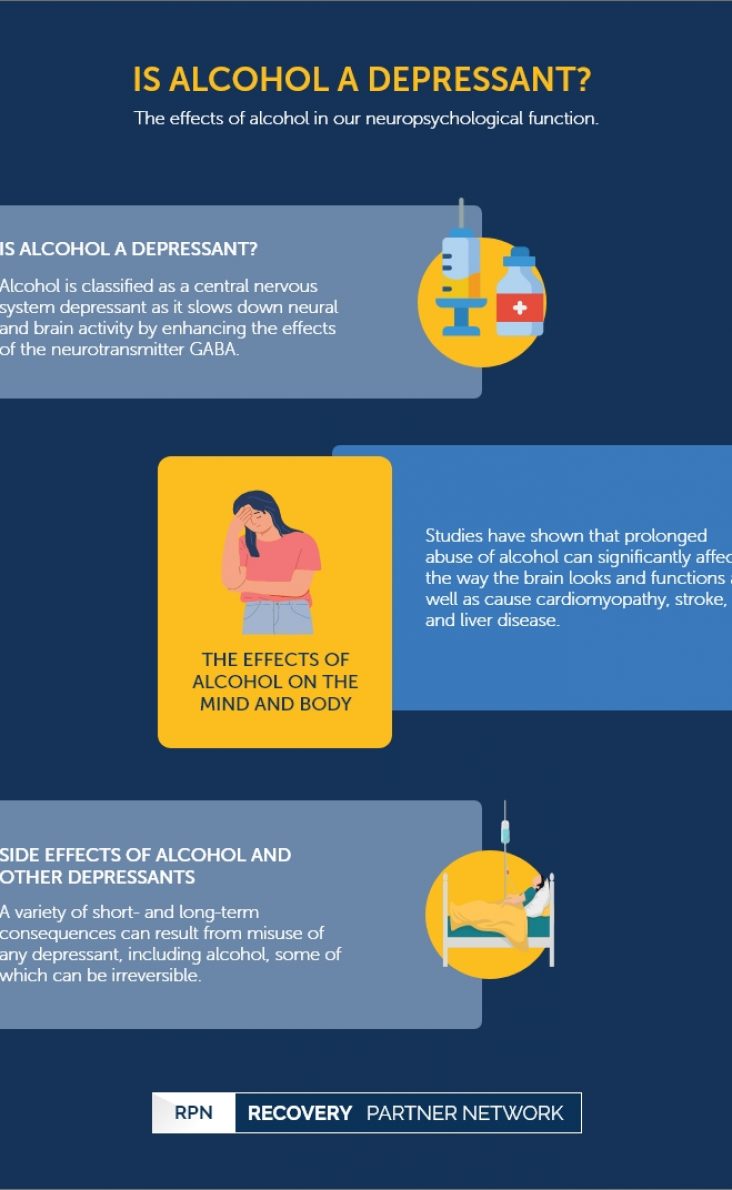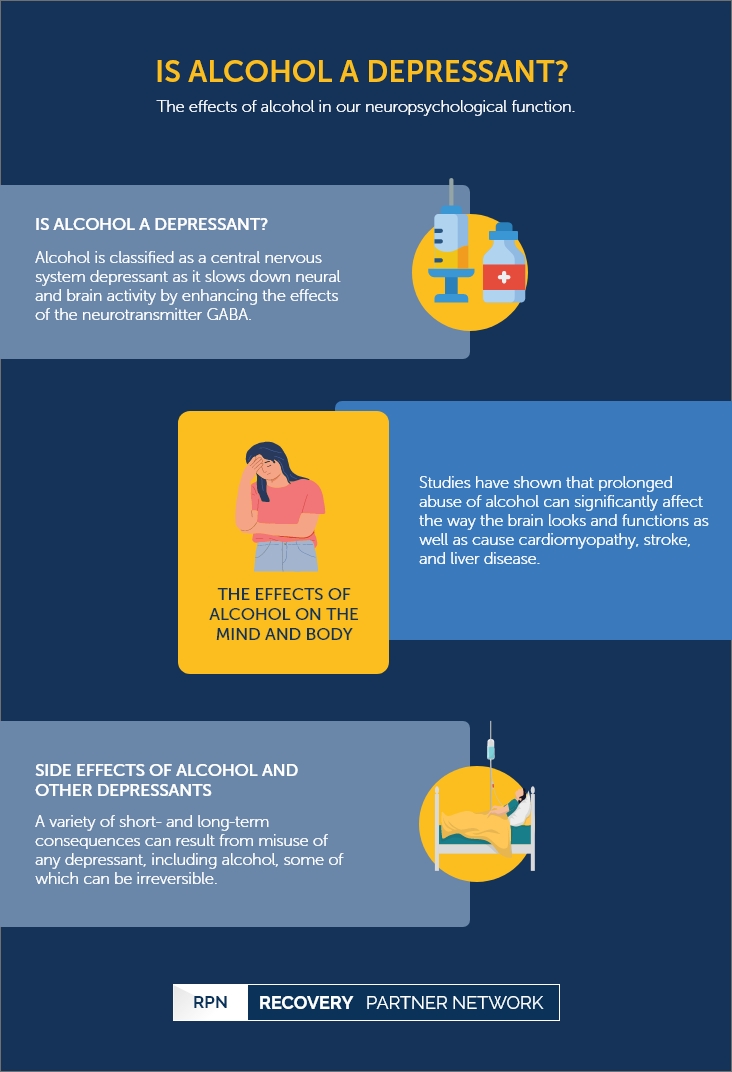The effects of alcohol in our neuropsychological function.
Is Alcohol a Depressant?
Alcohol depressant | Table of Contents
Is Alcohol a Depressant?
Alcohol imposes profound effects on an individual’s mood, behavior, and neuropsychological functioning. Although alcohol consumption is regarded as a great means of relaxation for many, its effects and hangovers further aggravate depression, induce anxiety, and increase stress. Alcohol is classified as a central nervous system depressant, implying that it slows down neural and brain activity by enhancing the effects of the neurotransmitter GABA.
Alcohol can greatly depress the central nervous system and cause impairments such as slurred speech, disturbed perceptions, unsteady movements, and slowed reaction. Alcohol also reduces inhibitions, distort judgment, and the inability to rationalize. If an individual proceeds to consume a vast quantity of alcohol too rapidly, the central nervous system depresses to the point of coma, respiratory failure, or even death.
Alcohol includes both sedative and stimulant effects. Although alcohol is clinically categorized as a depressant, the amount of alcohol consumed and the phase it is consumed plays a significant role in the type of effects experienced. Most individuals consume alcohol for its initial stimulant effects. However, when an individual consumes high levels of alcohol, they may undergo sedating effects that cause cognitive impairment.
FAQ
- Is alcohol a depressant or antidepressant?
- Is wine a depressant?
- Why does alcohol make you feel good if it's a depressant?
Many people use alcohol to enhance their mood, but alcohol is actually a depressant that can negatively affect one’s mental and physical health.
Although all forms of alcohol are classified as a depressant, the amount of alcohol consumed determines the type of effect experienced. Individuals who consume moderate levels may experience the stimulant effects of alcohol, while excessive levels can cause an individual to experience alcohol’s depressant effect.
Alcohol initially triggers the release of endorphins, chemicals that produce feelings of pleasure. Higher doses of alcohol consumption can suppress dopamine production and slow down your central nervous system, decreasing your blood pressure, heart rate, and mental clarity.
The Effects of Alcohol on the Mind and Body
Alcohol has a profound impact on the brain as it is able to block chemical signals between brain cells. Alcohol functions by binding the receptors of gamma-aminobutyric acid (GABA), a neurotransmitter that is primarily responsible for generating feelings of calmness and sedation as well as depressing the central nervous system. Alcohol also impedes the production of glutamate, causing memory loss and other brain impairments. In addition, alcohol also delivers dopamine, a neurotransmitter chemical responsible for reward and pleasure, causing individuals to consume even more alcohol in an attempt to enhance the euphoria generated by the release of dopamine.
Prolonged abuse of alcohol can cause the brain to adapt to the blocked signals. Causing the brain to form a dependence on its effects. Studies have shown that prolonged abuse of alcohol can significantly affect the way the brain looks and functions. The increased activity in the neurotransmitters over time can cause the neurons to burn out. This effect is referred to as neurotoxicity. Since neurons connect between different parts of the brain, the blockage, or the decrease in its function can cause a significant limitation between brain pathways. Alcohol abuse can also cause damage to brain matter. This reaction causes a visible shrinkage to the brain cells.
Alcohol abuse can also have adverse effects on a user’s heart, liver, and pancreas. The prolonged consumption of alcohol can weaken the heart, impacting how oxygen and nutrients are delivered to other organs. The long-term consequences of alcohol may include cardiomyopathy, stroke, and sudden cardiac death.
AUD patients are at a higher risk of causing harmful, potentially life-threatening liver problems. Binge drinking can overwhelm the metabolism process that results in fatty liver. This condition is a chronic disease that involves the buildup of bad fats in the liver. Over time this disease can also cause liver failure and type 2 diabetes.
The pancreas is part of the digestive process that helps regulate your body’s blood sugar levels. Long-term alcohol abuse can lead to pancreatitis, which is a form of cancer. Symptoms of an acute pancreatic attack may include abdominal pain, diarrhea, nausea, fast heart rate, and fever.
FAQ
- Does alcohol affect mood?
- What mental health problems does alcohol cause?
- Can alcohol worsen anxiety?
Alcohol can temporarily alleviate feelings of anxiety and depression, and people often use it for its stimulant effects.
Alcohol abuse can cause signs and symptoms of depression, anxiety, psychosis, and antisocial behavior during intoxication and withdrawal.
Alcohol changes levels of serotonin and other neurotransmitters in the brain, which can worsen anxiety. In fact, you may feel more anxious once the alcohol wears off. Alcohol-induced anxiety can last for several hours or even for an entire day.
Side Effects of Alcohol and Other Depressants
There are various other depressants in addition to alcohol. Commonly referred to as “downers,” these depressants are mostly medications that are prescribed to alleviate symptoms of anxiety, pain, and sleep disorders due to their unique tranquilizing effects.
Some of the most common depressants are:
- Xanax
- Valium
- Halcion
- Ativan
- Klonopin
- Librium
Abusing any depressant, including alcohol, can result in a number of short- and long-term effects, some of which can be irreversible. Although many individuals use depressants to enjoy their temporary, relaxing effects, the negative effects far surpass any positive associations. The consumption of multiple CNS depressants can cause an overdose that can be fatal.
Some of the side effects of depressant abuse are:
- Low blood pressure
- Slowed heart rate
- Fatigue
- Dizziness
- Slurred speech
- Depression
- Unconsciousness
- Vomiting
- Impaired motor skills
- Slowed breathing
- Nausea
- Seizures
- Death
- Slowed brain function
High doses of depressants can cause severe and adverse effects such as paranoia, aggression, and suicidal thoughts.
Long-term effects of depressants include:
- Tolerance
- Depression
- Respiratory issues
- Chronic fatigue
- Sexual dysfunction
- Insomnia
FAQ
While many symptoms generally resolve by the fourth or fifth day, mild cases of anxiety have been reported to persist for up to 3 to 6 months after drinking has stopped.
To reduce the risk of experiencing alcohol-induced anxiety, you must avoid drinking on an empty stomach, match alcohol with water, slow down your drinking, or set a limit and stick to it.
Recovery Partner Network
We aim to educate and empower. If you feel our library of resources does not cover your specific need, reach out to us, and we would be happy to help.
STATISTICS
© Copyright 2026


